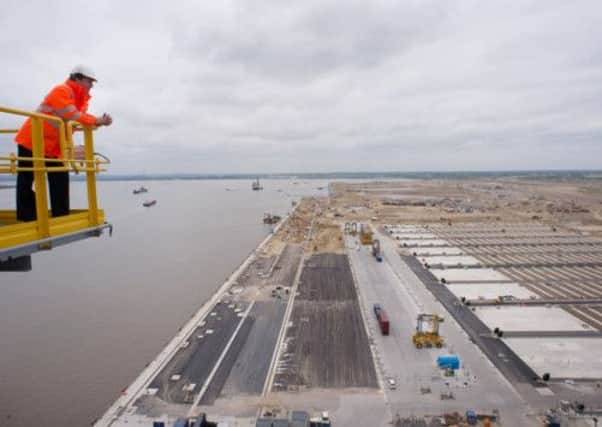Cameron risks backbench wrath with defence of EU and aid cash


In a speech setting out his vision of the UK’s role in the world a week ahead of the G8 conference in Northern Ireland, Mr Cameron insisted that continued membership of the EU and assistance for poorer nations were “in our national interest”.
And he accused critics who say the UK should focus on trade in its foreign policy, ditch commitments to help with global poverty and climate change and cut links with multinational organisations of pursuing a “short-term, narrow” agenda which “falls apart under closer scrutiny”.
Advertisement
Hide AdAdvertisement
Hide AdSpeaking at the new London Gateway deep-sea container port in Essex, Mr Cameron argued that the Government is in a “battle for Britain’s future”, blaming Labour for “passing the buck”.
He acknowledged the pain of austerity, but insisted the country has started reforming “just in time” with a “complete plan for national renewal”.
“We are in a battle for Britain’s future, and it is a battle that we must fight on two fronts,” Mr Cameron said. “At home, ambitious about competing. Abroad, ambitious about pursuing our national interest and standing up for our values.”
Highlighting some key Conservative dividing lines with Labour, the Premier said: “We have identified, very clearly, our key areas of national weakness compared to the rest of the world.
Advertisement
Hide AdAdvertisement
Hide Ad“One – our debt-fuelled, unbalanced economy. Two – our bloated welfare system. Three – our under-performing education system.
“Fixing these things are the three key domestic priorities of this Government. And though it’s taking time, we are making progress and getting our country into shape.”
Turning to Britain’s connections abroad, the Prime Minister restated his pledge for an in-out referendum on Britain’s EU membership if the Tories win the general election.
But he made a strong argument for Britain’s continued membership of a reformed EU.
Advertisement
Hide AdAdvertisement
Hide Ad“When your prosperity is won in far-flung places, when your fortunes are disproportionately affected by what happens beyond your borders, then your national interest is not just about standing up for yourself – but standing up for what’s right, and standing for something more.”
He cited his decision to protect the aid budget at 0.7 per cent of GDP and to put the battle against hunger in Africa at the heart of the agenda for the UK’s year-long presidency of the G8 as examples of Britain exerting its influence for good overseas.
“We are playing our part to build a world that is more stable and more ordered, because it is right in itself and because it is in our own enlightened national interest,” he said.
“Another key part of that effort is our place in international organisations. At the UN. The Commonwealth. Nato. The WTO. The G8. The G20. And yes – the EU. Membership of these organisations is not national vanity – it is in our national interest.”
Advertisement
Hide AdAdvertisement
Hide AdHe contrasted his approach with that of critics who say “our presence in the world should be purely trade-focused, we should lose all the old commitments, the obligations to help with global problems like poverty, conflict or climate change, we should cut aid and scale back our defence commitments, we should turn our backs on the big multilateral organisations and be nimble operators, doing our own thing”.
Mr Cameron said: “It is a flat calculation of our national interest in terms of pounds and pence. It fails to take account of our influence and, above all, it falls apart under closer scrutiny.”